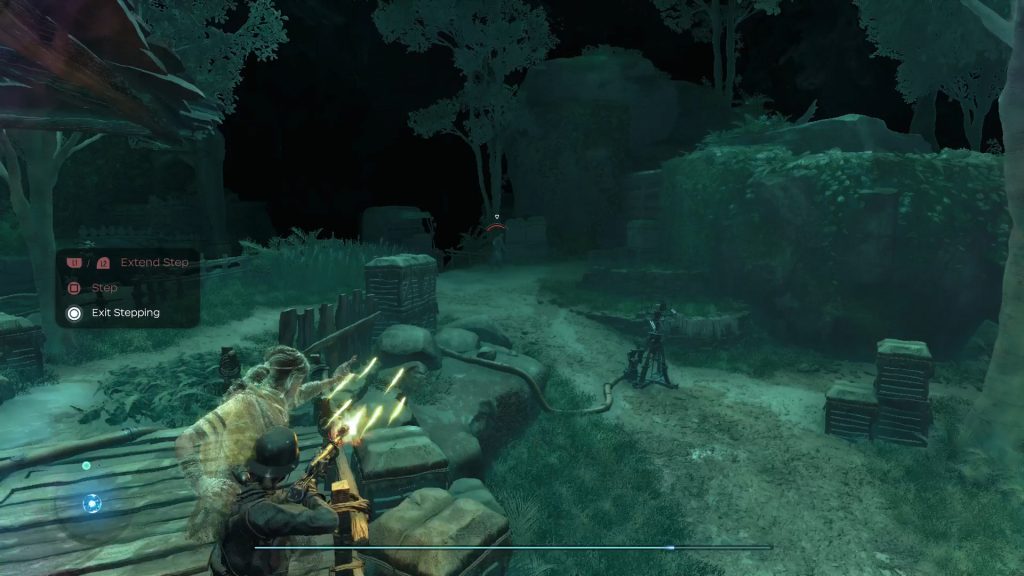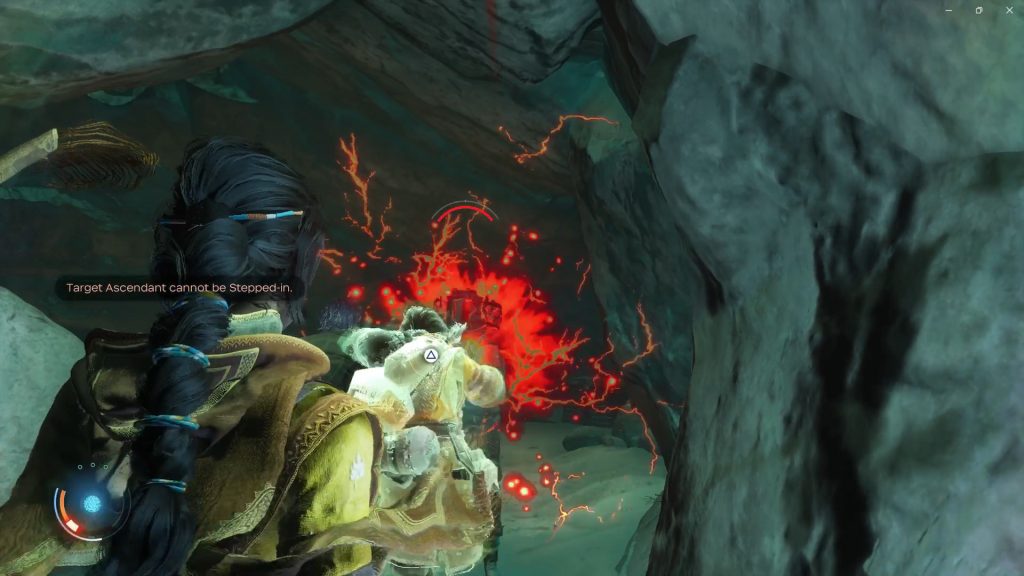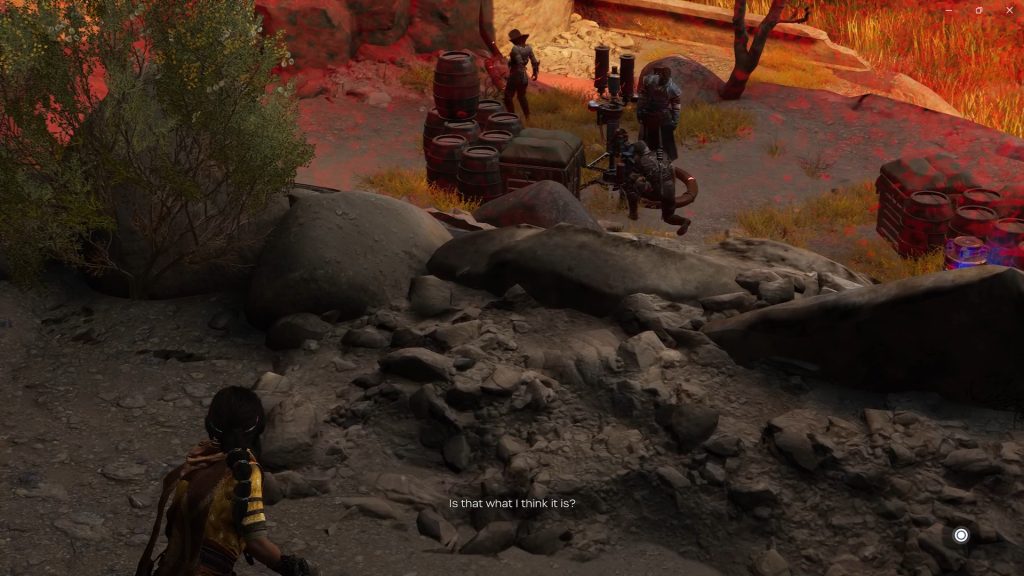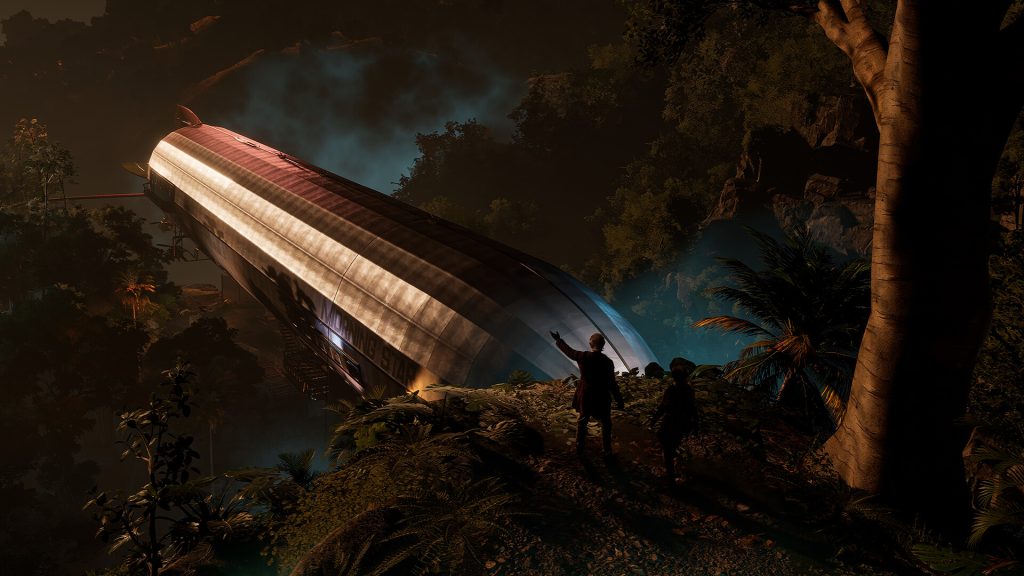
Unknown 9: Awakening is the first of a collection of multimedia projects ranging from novels to audio dramas. As an intro to the wider Unknown 9 universe, Awakening builds intrigue and sets up the worldbuilding quite nicely while acting as a standalone game experience in its own right. And it’s worth mentioning off the bat that this is a very ‘gamey’ video game and not at all a narrative walking sim like some previews might suggest. The story of Haroona and her journey to avenge her mentor and accept her newfound abilities as a Questar is rather well-told and cinematic. The general vibe and genre of Unknown 9 is a blend of the swashbuckling escapades of something like Uncharted with the more conspiratorial aspects of Assassin’s Creed. Throughout the course of Unknown 9, you’ll encounter secret societies, journey through the jungles of India, and tap into the fabric of reality using Haroona’s Umbral abilities.
I mentioned how the game was cinematic earlier, and while it has the framework and elements of a blockbuster film, it doesn’t overly rely on rendered cutscenes to tell its story. Most of the story is told through character dialogue and in-engine scenes, and it’s the former where Unknown 9 really shines. While I do appreciate the occasional scenes, there’s some awkward transitions here and there that gave me scripting whiplash, as it were. One minute we’re arguing on the airship, the next we’re abruptly searching through a jungle by ourselves without context. These jarring scene transitions aren’t prominent through the experience, but you’ll notice them when they occur. By contrast, the dialogue between characters is well-written, with communication occurring organically between the characters and not with the player directly, as so many games clumsily do. There’s a subtlety and wit here that reminds me of classic BioWare at times. Nowhere is that better reflected than through companion conversations aboard your airship hub. You’ll be introduced to the airship a couple levels into the game, returning to it after every other level to interact and catch-up with crewmates.
“Conversing with your crewmates aboard the the airship displays some of the game’s best writing and characterization.”
It was in these moments aboard the airship getting to know all the companion characters where I enjoyed Unknown 9 the most. The crew aboard the ship have updated dialogue every time you return after an outing on land in true Mass Effect Normandy fashion. I find the characters’ personal stories and personalities to be a highlight of the game, despite the protagonist’s more abrasive and untrusting persona. I wish I liked the protagonist of Unknown 9, Haroona, as much as the rest of the cast, but even by the end of the narrative, her standoffish distrust and arrogance didn’t really evolve or charm me. That said, Haroona, just like the rest of the cast, have a well-developed backstory that informs their motives. Characters like the quirky navigator trying to get Haroona to listen to opera, or the casual and likeable bartender reminiscing on his time in the American Civil War continued to be the highlight of the whole experience for me, prompting me forward even when other parts of the game kept trying to get me to quit.
As for plot, it follows a more or less traditional structure; the protagonist realizes their potential after losing their mentor and gets embroiled in a wider scheme as they join a ragtag resistance group. I could see some of the plot twists a mile away, but everything is well-told and presented with sincerity, so I didn’t mind when it stepped into tropes. Also, props to the story not beating me over the head with themes or endlessly repeating plot points as if I were an idiot; the game respects the player’s intellect.
“You journey through a number of diverse environments from Indian jungles to Portuguese mansions, all housing numerous collectables.”
While we’re on the subject of things Unknown 9 does well, exploring the baubles and furnishings within the airship is a delight thanks to the variety of doodads and scattering of collectables hidden throughout. I enjoy the exploration in general, whether it be the jungles of India or the subterranean caves hiding secrets of the mysterious godlike Unknown 9 and their influence of historical events. Environments are decorated with a high attention to detail, which is helped by the game’s superb graphical quality and dynamic lighting. You really get a sense of the dampness of the Indian forests and the dry heat of the desert locations, but facial animations aren’t nearly as great. Facial animations look stilted, almost like they’re placeholders, which is an unfortunate contrast to the wonderfully textured and detailed environments.
While I thoroughly enjoyed my time exploring the dense jungles and Victorian mansions, the same can’t be said for the game’s combat. We’ll start with what I do like about combat first. Much of the game’s early combat scenarios involve sneaking through tall grass to overcome foes through stealthy back attack assassinations and ranged tampering of explosives through the Crush ability. You can even throw psychic ‘stones’ to distract enemies and use a psychic Peek ability which acts as a survey lens to see enemies and interactables through objects. I rather enjoyed these early stealth-oriented sections of the game and favor them to the more direct tanky approach the latter sections necessitate.

“The Step ability grants you control of an enemy’s body until your Umbral meter drains, giving you the upper hand in most encounters”
Integral to to most encounters is Haroona’s Step ability, which grants control of an opponent for a limited time, allowing you to attack other enemies or set off explosives. Step is particularly useful when overwhelmed by large groups, something that happens far too often halfway through the game. While I do like the kit available to Haroona, the abundance and size of the enemy encounters halfway in the game don’t accommodate her Umbric abilities very well. Haroona is no tank, and your occasional combat companion barely does anything to help you overcome your foes, making a majority of the later encounters feel tedious and mismatched. Sure, you have a magical shield with parries and a brief invisibility trick to evade potential disaster for a time, but there’s only so much you can do when there’s devices that restrict those abilities in tandem with heavy ‘mini-boss’ enemies.

“Gearhead enemies restrict your Step ability. Many other machines and enemies restrict other Umbral abilities as well, although you can overcome some restrictions by advancing in the skill tree”
Take Gearheads for instance. Your first encounter with a Gearhead is awful, as you have no defensive terrain to hide behind nor tall grass to fall back to. Worst of all, you cannot use Step on Gearheads, rendering your most valuable tool worthless. So many of these fights whittle down to clunky melee bouts where your coolest Umbral abilities are taken away, and there’s a tad too many of them considering how emphasized the stealth and Umbral abilities are in general. It doesn’t help that the number of bugs increases as more opponents get thrown at you. I’ve had several instances where I couldn’t jump across gaps because my character was stuck in a combat animation, resulting in a swift death. I’ve also been stuck in terrain during certain fights involving busier terrain featuring rocks and the like. Unknown 9 is at its worst during these large group battles with heavy opponents that restrict certain Umbral powers. The melee in this game isn’t great, due to inconsistent lock-on and vague punch hurt boxes, yet the second half of the game insists on overwhelming you with waves of these kinds of enemies.

“Overwhelming combat encounters featuring a dozen-plus opponents are common mid-way through the game, unfortunately”
Repetitive melee-based encounters aren’t the only hiccup in Unknown 9’s gameplay though; character dialogue and banter often gets cut off when progressing or triggering an encounter. In a different vein, companions often nag on you to “hurry up”, repeating their demand incessantly until you follow the main path forward. This nagging really discourages exploration, which as I stated earlier is one of the game’s best qualities. I was especially annoyed when being yelled at for not progressing the main story aboard the airship; I wanted to hear all the companion dialogue and explore the wonderful environment, so why doesn’t the game want me to?
Some other slight niggles are the absence of performance or graphics modes on console. I was stuck with the game hovering around 40 FPS, with frames getting choppier during some of the overwhelming group fights. Oh, and you cannot change difficulty after you start up a new game, so select between the four difficulty settings wisely because you’ll be stuck with it.

“Despite its flaws, Unknown 9 delivers some wonderful story moments and fun gameplay when it wants you to explore”
I really was beginning to fall for Unknown 9: Awakening as I approached the midway part of the narrative, but then the game insisted on me going melee and threw repetitive enemy encounters at me like it forgot what makes it tick. The game shines in its explorative moments, and especially so when conversing with the crew aboard the (airship name). The game’s combat works well when it encourages stealth and allows you to use your umbral abilities without abandon, making me question why they threw enemy waves at you like they do during the second half of the game. The story and worldbuilding are a treat though, and you’re bound to find one or two characters to grow attached to throughout your time in Unknown 9’s world. I’ll be interested to see the related projects within the Unknown 9 universe since Awakening has shown promise with its worldbuilding, despite its gameplay irritations.
This game was reviewed on the PlayStation 5.







